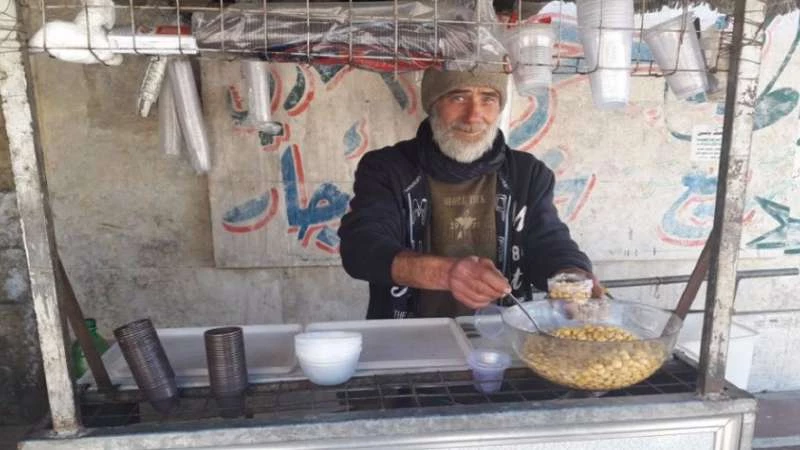Many of those beloved traditions have suffered under the conditions of war but some are finding ways to survive thanks to people who are determined to keep them alive.
Buying Termos (the Arabic name for Lupini beans) from roaming street vendors in local neighborhoods and eating them in groups on street corners and in alleyways may sound too random and chaotic to be considered a tradition, but for many Syrians it evokes memories of intimate moments spent with family and friends.
With his blue eyes and beautiful smile, Abu Hasan stands on a corner near Hettin School in the city of Idlib every day from 7:00 in the morning until 3:00 in the afternoon waiting for the students to come buy his Termos..
Termos is a popular type of cultural food in Syria and even the children are fond of the familiar yellow beans, especially when dressed with vinegar and a range of local spices.
Abu Hassan smiles a lot as he talks about the benefits of Termos. “It is a great substitute for pharmaceuticals and has a gold mine of benefits,” he says. “It is also good for diabetes and joint pain.”
Next to him a young man talks about the benefits of Termos while he browses through informational websites on his phone.
“Lupini beans contain mineral salts and a component made up of a mixture of calcium and phosphorus. They are also considered to be one of the richest sources of dietary fiber,” he says as he looks at Abu Hasan.
“They are a good tonic for the nerves, help prevent heart problems and some skin diseases, help to reduce blood sugar and improve bowel function,” he adds.
Abu Hassan laughs and says “I told you it’s a pharmacy” then begins to yell; “Come to the pharmacy… come get your medicine!”
Abu Hassan is the only remaining Termos vendor in the city of Idlib since the price of one kg of Lupini beans rose to 3,000 Syrian pounds and the dealer no longer wants to bring them into the city.
Abu Hasan fetches the beans himself from Jarjnaz, a village located east of the city of Maarrat al-Nu’man in the Idlib Governate.
“I cannot afford to pay for more than 10 kg each week,” he says.
Lupini beans contain bitter alkaloids and preparing them is a time consuming process of washing, boiling, soaking and draining again and again until the bitterness has been washed away and the beans become edible.
While the beans are being prepared to be sold, Abo Hasan also busies himself preparing “Dakka” which gives his “Termos” its delicious flavor.
“Dakka” is a combination of dried mint, dried chilies, cumin, zaatar, rosemary and a little lemon salt ground together into a fine powder which is then sprinkled over the beans with white vinegar.
Abu Hassan says that he previously worked in the construction industry as a builder but when he was no longer able to work in such a physically demanding profession, he began to sell Termos.
He says it is a comfortable career despite the lack of profits due to the terrible economic climate in Syria in recent years.
In spite of the high price of the uncooked Lupini beans, one small package of Termos sells for only 200 Syrian pounds, half a pack for 100 pounds, and a very small amount for 50 pounds.
But Abu Hassan is not motivated to do what he does for money.
“The most beautiful enjoyment for me is watching young people and children sitting together and listening to their conversations while they eat Termos,” he says with a twinkle in his eye and his ever present smile.



التعليقات (0)